
Afghanistan during the 20ths
King Amanullah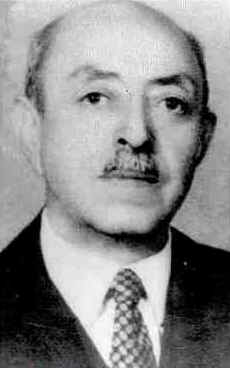
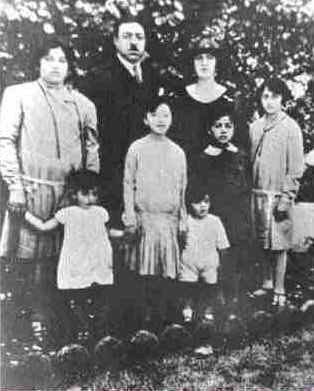
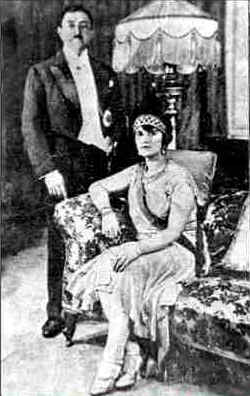




King of Afghanistan, 1919-29. Born in 1892, the son of Amir Habibullah and Sarwar Sultanah, the queen. When Amir Habibullah was assassinated in Jalalabad in February 1919, Amanullah Khan was governor of Kabul and in possession of the arsenal and the treasury. He was crowned in Kabul over the prior claims of his uncle Nasrullah, whom he denounced as a usurper and an accomplice in the murder of his father. King Amanullah (he assumed the title of king in 1926) was an ardent reformer and contemporary of like-minded rulers, Muhammad Reza in Iran and Kemal Ataturk in Turkey. He demanded a revision of the Anglo-Afgha agreements concluded by Amir Abdur Rahman which left Britain in charge of Afghanistan's foreign relations in exchange for protection from unprovoked Russian aggression and a subsidy in money and military materiel.
British reluctance to accept a change in the status quo led to Afghan armed attacks, culminating in the start of the third Anglo-Afghan war on May 3, 1919. Britain was war-weary and in no condition to wage war on the Indian frontier and, after lengthy negotiations in Rawalpindi, Mussoorie, and Kabul, peace was restored, leaving Afghanistan free and independent from British control . King Amanullah became a national hero and turned his attention to reforming and modernizing his country. He established diplomatic and commercial relations with major European and Asian states, founded schools in which French, German, and English were the major languages of education, and promulgated a constitution which guaranteed the personal freedom and equal rights of all Afghans. He built a new capital, named Darulaman , which include a monumental parliament and other government buildings as well as villas of prominent Afghans. Social reforms included a new dress code which permitted women in Kabul to go unveiled and encouraged officials to wear Western dress. Modernization proved costly for Afghanistan and was resented by the traditional elements of Afghan society. The Khost rebellion , a tribal revolt in 1924, was suppressed and Amanullah felt secure enough to travel to Europe in december 1927. Upon his return he faced increasing opposition and, in 1928, an uprising of Shinwari tribesmen, followed by attacks of forces of Habibullah Kalakani, forced the reformer king into exile. A fter an unsuccessful attempt at regaining the throne, he crossed the Indian border on May 23, and settled in Italy and Switzerland until his death on April 26, 1960. He was buried in Jalalabad at the side of the tomb of Amir Habibullah.Flags of Afghanistan during:
King Amanulla 1919 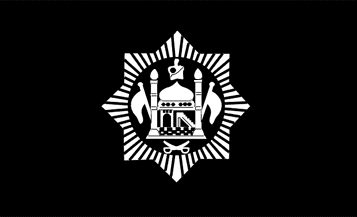
King Amanullah 1928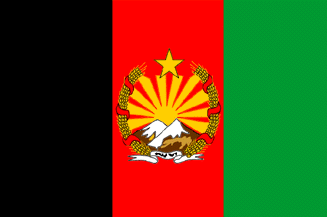
![]()
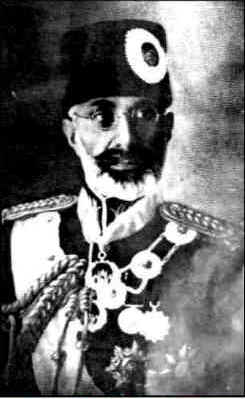
King of Afghanistan, 1929-33. Born in 1883, the son of Sardar Muhammad Yusuf Khan, he embarked on a military career. Appointed a brigadier in 1906, he was promoted to lieutenant general, naib salar, for his services in suppressing the Mangal revolt in December 1912. Appointed general, sipah salar, 1914.
He and other members of the Afghan court had accompanied Amir Habibullah to Jalalabad, the winter capital, and when the amir was assassinated in his sleep, he was arrested. Amir Amanullah exonerated him of any involvement and sent him to command the troops in Khost province. During the third Anglo-Afghan war, Nadir Khan led an army across the Afghan border into Waziristan and invested the British base at Thai.
This threatened to cause a general uprising among the "British" Afghans and Amir Amanullah appointed him minister of war in 1919, in which post he served until 1924, when he was appointed Afghan minister at Paris. He resigned two years later because of illness (or because he disagreed with King Amanullah's policies). Nevertheless, he remained in France where he was joined by his half-brother Muhammad Hashim Khan and his brother Shah Wall Khan.
After the abdication of King Amanullah in January 1929, Nadir left France for India and established himself at the Afghan frontier. He collected tribal support, including Waziri tribal forces from the Indian
Flag of Afghanistan during Nadir Shah : 1929 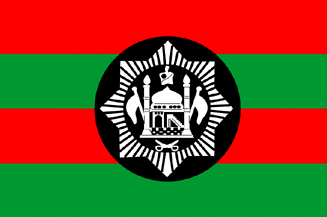
![]()
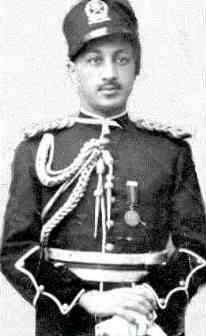
King of Afghanistan, 1933-73. Born on October 15, 1914, the only surviving son of Nadir Shah, he was educated at Kabul and in France. He was proclaimed king on November 8, 1933, within a few hours after his father's assassination and adopted the titleAl Mutawakkil Alelah, During the early period of his reign (1933-46), the young king reigned while his uncles Muhammad Hashim and Shah Mahmud ruled, holding the powerful position of prime minister. His cousin, Muhammad Daud, succeeded as prime minister from 1953 until 1963, when Zahir Shah forced his resignation.
In 1964 he promulgated a new constitution which excluded members of the royal family from certain government positions provided for a bicameral parliament, free elections, a free press, and the formation of political parties. It ushered in a period of unprecedentted political tolerance which was marred only by the intransigence of parliamentary representatives who could not establish a working coalition. The law on political parties was never ratified by the king, but parties were tolerated, althought not legally permitted, and numerous groups published their manifestors in privately-published newspapers and periodicals. Members of parliament were elected as independents and not members of a party, but parliament was stymied with political infighting.
Foreign aid from East and West kept flowing into the country, and Kabul experienced considerable growth. However, not all sectors of Afghan society benefitted from the economic development. Zahir Shah toured Afghanistan on several occaisions and frequently traveled abroad. During one of his trips abroad, his cousin Muhammad Daud staged a coup and established a republican government with himself as president.
Zahir Shah abdicated in August 1973 and has since lived in Italy. The impasse in the present war has led demands by some that the ex-king return to serve as head of an interim governmetn which would end the war and establish a representative government in Afghanistan. As a result of US invision which begun 7 october 2001 and downfall of taliban , he is once again on the move to take power.
Flag of Afghanistan during Mohammad Zahir Shah1933-1973
![]()
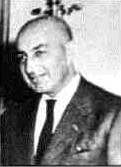
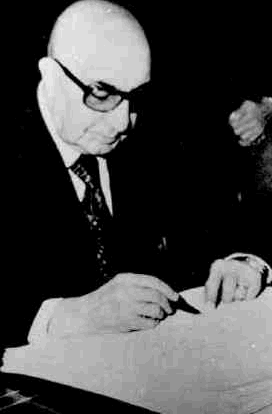
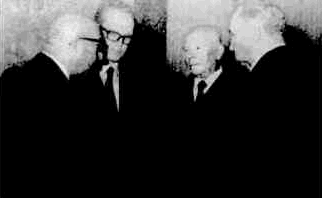

Born in 1919 and President of the Republic of Afghanistan from July 1973 until his assassination in April 1978 as a result of the Saur Revolution.
He is the son of Sardar Muhammad Aziz, and was governor and general officer commanding of the Eastern Province (1934), Kandahar (1935), and commander of Central Forces (1939 47) stationed
in Kabul and minister of defense in 1946. A minister of interior (1949-50) and prime minister (1953-63), he encouraged social reforms and in 1959 permitted women to abandon the veil, thus contributing to their
emancipation and participation in the economic life of Afghanistan. He initiated two five-year plans (1956-61 and 1962-67) a seven-year plan in 1976, and relied for military and development aid on the Soviet Union.
He demanded the independence of Pashtunistan , the North-West Frontier Province of Pakistan, which led to repeated crises with Pakistan and ended with his resignation in 1963.
Ten years later Muhammad Daud staged a coup against his cousin, King Zahir, and in July 1973 proclaimed Afghanistan a republic. Whether he just wanted power or felt that the political
liberalization during the democratic decade (1963-73) had failed to remedy the social and economic problems of Afghanistan is not clear. He relied on the support of leftists to consolidate
his power, crushed the emerging Islamist movement, and in 1975 established his own "National Revolutionary Party". Financial support from Iran and the Arab Gulf states was to enable him to
repay Soviet loans and improve his relations with the West. He and members of his fmily were assassinated on April 27, 1978, as a result of the Saur Revolt which brought People`s Democratic Party to power in Kabul.
Main Events:
July 17, 1973. Mohammed Daoud deposed his cousin, the king Mohammed Zahir Shah, and proclaimed republic.
July 18: Mohammad Daoud proclaimed President and defense minister.
August 24: Deposed King, Mohammad Zahir, announced his abdication.
Feb. 1974: A trade agreement was signed with Iran.
July 28, 1975: Afghan security forces captured a terrorist group in Panjshir which was armed by Pakistan.
Dec. 2, 1975: Afghanistan denied Pakistani charges that it had mobilized troops along its border with Pakistan.
Apr. 23, 1976: The League of Red Cross Societies said that about 100,000 people in Afghanistan had been left homeless by earthquakes, torrential rains, and floods.
Jun 7, 1976: Pakistan President Bhutto met with President Mohammad Daoud.
July 4, 1976: Indian Premier Indira Ghandi arrived in Kabul for a three-day visit.
Dec. 9, 1976: According to reports, more than 50 people had been arrested and accused of a plot to overthrow the government.
Feb 24, 1977: A new constitution approval.
March 29 : An agreement had been reached in Kabul to resume air links between Pakistan and Afghanistan.
Nov. 16: Minister of Planning Ali Ahmad Khurram was assassinated in Kabul.
Feb. 21, 1978: President Mohammad Daoud left Kabul for Belgrade on an official visit to Yugoslavia.
Feb. 24: A trial of 25 people accused of plotting to assassinate President Daoud had begun in Kabul.
April 17: Mir Akbar Khaibar, one of the founders of the People's Democratic Party of Afghanistan (PDPA), was assassinated in Kabul.

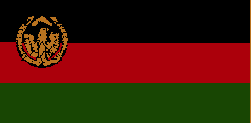
![]()
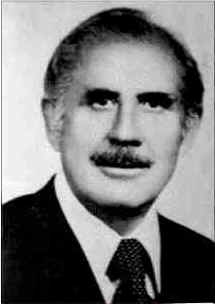
Member of the Khalq faction of the PDPA and, after the Saur Revolt, president of the Revolutionarv Council and primer minister of the Democratic Republic of Afghanistan. Taraki was born of a Ghilzai nomad family on July 15, 1917 in Ghazni province. After attending a village school in Nawa, Ghazni province, he took night courses in Bombay and college credit in Kabul. He worked as a clerk for Abdul Majid Zabuli at the Pshtun Trading Company in Kandahar and at its office in Bombay. Because of his knowledge of English he was able to obtain employment in various Afghan ministries and at Bakhtar News Agency. In the 1950s he became known as an uthor and journalist, and in 1953 he served for a few months as press attache at the Afghan embassy in Washington. Subsequently he opened the "Nur Translation Bureau" in Kabul, which translated Dari and Pashto materials for various foreign missions in Kabul, including the American embassy.
His ideological transformation from social critic to left occurred in the earlyl960s. Taraki convened the founding congress of the PDPA on January 1, 1965, which was attended by 30 persons. The members elected him secretary general in a split decision, some voting for his subsequent rival Babrak Karmal, who was elected secretary of the central committee. In April 1966, Taraki started publication of Khalq , the party organ, which became also the name of his faction of the PDPA. In 1967 the party split into two factions over tactical and leadership disputes, until ten years later they reunited and attained power in a coup in April 1978. After the Saur Revolt, Taraki became the "Great Leader" and a personality cult prepared the way to legitimize his rule as the "teacher and great guide" of the Communist movement. Leading Parchamis were purged from government positions and Taraki's Khalqis ruled until a new split developed among the Khalqis. Hafizollah Amin attacked his former teacher as unfit for leadership. The "red khalqis" of Taraki and black khalqis" of Amin were pitted against each other and Hafizullah prevailed. On October 9, 1979, Taraki was secretly executed. Main Events:Flag of Afghanistan during Noor M. Tarki:1978-1980
![]()
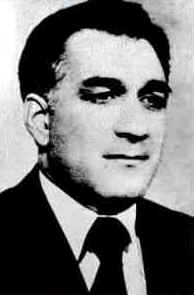
Born 1929 in Paghman, Kabul province. President of the Democratic Republic of Afghanistan from September 1979 until his assassination on December 27, 1979. He was of the Kharoti (Ghilzai Pashtun) tribe whose family came to Paghman in the 19th century. Educated in Afghanistan and the United States. He became a teacher and later principal of Ibe Sina School and Teachers Training school in Kabul. His conversion to Marxism is said to have occurred in 1964. He was elected to the 13th session of parli-ment (1969) as a representative from Paghman. During the republican period (1973-78) he successfully recruited followers in the army in competition with Parchami efforts. After the Saur Revolt he was appointed vice premier and minister of foreign affairs. In April 1979 he became prime minister and, after he ousted Nur Muhammad Taraki, he became president on September 16, 1979. Some observers called him the Afghan "Tito" because of his independence and nationalistic inclinations and many think he was a CIA agent. He was accused of responsibility in the assassination of thousands. Soviet special forces attacked him and his bodyguard in Darulaman, assassinating him on December 27, 1979. He was replaced by Babrak Karmal of the Parchami faction of the PDPA.
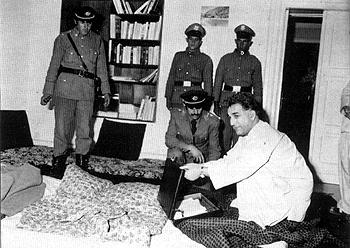
![]()
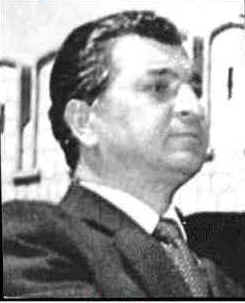
President and secretary general of the PDPA from January 1980 until May 1986, when Dr. Najibullah took over control of the Afghan government. Born in 1929 in Kabul, the son General Muhammad Husain . He was then elected vice-chairman of the revolutionary council and deputy prime minister of Afghanistan. In July 1978, the Khalqi regime purged the Parchami leadership, appointing Karmal Afghan ambassador to Czecho Slovakia. In August, 1978, he was accused of plotting against the Khalqi government and stripped of party membership and all his positions. Having being restored to power with Soviet assistance, he succeeded Hafizullah Amin on Dec. 27, 1979. He was an elegent actor , an expert propagandist and the best known of the Marxist leadership. Having been restored to power with Soviet support, he was unable to consolidate his power and, in 1986, he was replaced by Dr. Najibullah. He left Afghanistan for Moscow, but returned to Kabul in 1989. He died december1996 in Moscow and burried i Hairatan.
Main Events:Flag of Afghanistan during Babrak Karmal: 1980-1986
![]()
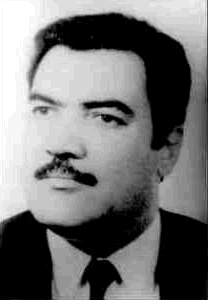
President of the Republic of Afghanistan and general secretary of the PDPA since May 1986. Born in 1947 in Kabul of an Ahmadzai family. His father was Afghan trade agent in Peshawar. he was educated at Habibia high school and Kabul University graduating from the College of Medicine in 1975. He became a member of the Parcham faction of the PDPA in 1965, and was repeatedly arrested for his political activities. After the Saur Revolt he was appointed Afghan ambassador in Tehran (July-October 1978), in a move to get leading Parchamis out of the country, but was quickly dismissed with other Parchamis by the Taraki government, when they were suspected of plotting a coup. He remained abroad and returned to Kabul with Babrak Karmal after the ouster of Hafizullah Amin in the final days of December 1979. He held the position of general president of KHAD (1980-86)and in l986 replaced Babrak Karmal as secretary gener al of the PDPA. He purged the central committee and brought in new members and reorganized government in 1988 and 1990. In March 1990, the successfully withstood a Khalqi coup, headed by Shahnawaz Tanai , his defense minister.
He has downplayed Marxist ideology and annulled most of the early "reforms." He has refused to step down but indicated his willingness to permit national elections and accept the results.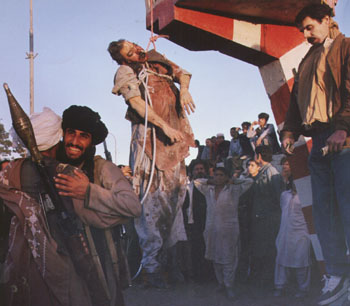
Flag of Afghanistan during Najibullah: 1986-1992
![]()
continuation of civil war:
It is one of the longest and bloodiest war After the War War II. This War left more than 15,000 Soviets and about 1,000,000 Afghans death, many injured, more than 3 millions refugees all around the world . The entire economy and urban infrastructure of the country destroyed by the war. The Afghan Conflict became a real Civil War when the Afghan Mujaheddin became to the power of Kabul in 1992. More than 50,000 people were killed as results of fighting among Mujaheddin fractions in 1992. The Afghan Mujaheedin couldn't realize the expectation of Afghan people who hope that finally the peace will come their homeland. The leaders of Mujaheedin have been corrupted by long and beneficial war against the Kabul regime and Soviet troops. Ethnic differences and rivalry have resulted a bloody fractional fighting and crimes. Kabul become a rubbles and the residence of 2 million population became hostage of people who claim the victory against Soviet troops. The ethnic fighting between Pashtouns, Tajiks, Hazarahs and Uzbeks in different part of Afghanistan left thousands of causalities all around the country. Kabul with a multi-century history became the center of fractional fighting of Mujaheedin groups. Most of its building were destroyed and looted. Kabul University and Kabul Polytechnics Institute have been burned and closed. Kabul museum has been looted and all its treasuries have been moved by Mujaheedin's leaders and other commanders. So, "Taliban emerged as results of rape of Afghan people by Mujaheedin."
A newly conflict aggravate the Afghan problem as a results of capturing the power by the Taliban movement in Kabul in 1996. Taliban controled more than 95% of the country except the northern parts. The Talliban have imposed a strict version of Islam by banning the women for work and school. Taliban have destroyed anything is against the Islamic laws and rules based on their understanding. The demolishing of multi-century cultural heritage of Afghanistan the Buddha's statues in Bamian is the confirmation their views to the world. Now, Afghanistan is under UN sanction because Taliban gave safe heaven for the number wanted terrorist Osma ben Laden. Sanction has hurt ordinary people. The Afghan problem today is in the front page of global issues.On october 7th 2001 US launched attacks on Afghanistan:
![]()
Sebghatullah Mojadedi

April 1992- aug. 1992
President of Afghanistan under Mojahedin
Jabh-e Mili Najat-e Afghanistan ( National Liberation Front of Afghanistan) Mojadidi was imprisoned from 1959 to 1964 for involvement in a purported plot to assassinate Soviet Primer Minister, Nikita Khrushchuv. He participated in anti-reformist demonstrations in Kabul in 1970s and was forced to flee outside the country in order to escape arrest. He carried out the responsibility of Copenhagen Mosque in Denmark. He founded "Jami'at Ulamai Mohammadi"(Organization of Muslim Clergy) in 1972. The first head of government of Mujaheddin Council from April 1992 to October 1994 in Kabul. Some sources confirm that his root is from Mojadidi family who lived in India and England at the beginning of this century and then they moved to Afghanistan.He is more moderate. He couldn't establish any types of reconciliation among Mujaheddin fractions.In recently political activities during the Taliban power, Mojadidi is not involving
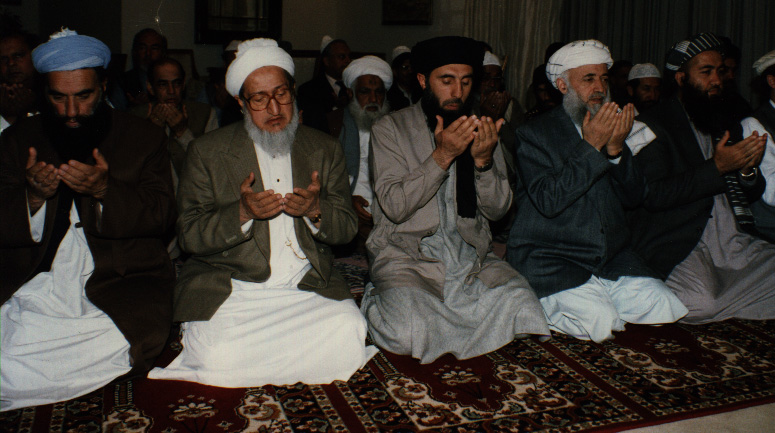
From left to right : Mohammadi, Mojadedi , Gulbodin , Rabani and Sayaf praying for peace
![]()
President of Afghanistan Oct. 1993- Sept. 1996
Jamiat-e Islami-e Afghanistan (Islamic Society of Afghanistan Birth: 1940, Faiz Abad/Badakhshan Province

After the proclamation of Republican Regime in Afghanistan by President Mohammad Daoud in 1972, Rabani fled to Pakistan in 1974 after series of antigovernment activities inside the country. In Pakistan he sought the support of Pakistani government and the group of "Jamiat-e Islami". He carried out military activities during 1978-1992 within Afghanistan against Kabul regime. After the resignation of Najibullah in 1992, B. Rabani was elected as intrim president of Islamic Council of Mojahedin factions for 1 year by Mujaheddin executive council in October 1992. He didn't resign under previous agreement and remained in power until 1996. He spent most of his presidency in fighting with other Mujaheddin militia who forced to oust him from Kabul power. As results of fierce fighting between his chief of Command Ahmad Shah Masoud and rival Gullboddin Hekmatyar of Hezib-e Islami Afghanistan more than 50,000 people were killed in Afghanistan recently.
Flag of Afghanistan during Rabani
![]()
Hezeb-e Islami Afghanistan (Islamic Party of Afghanistan), Radical Islamic Movement
 Gulbuddin Hekmatyar
Gulbuddin HekmatyarBirth: 1940, Emam Saheb/ Kundoz Province

The most powerful warlord during the Mujahedin`s battle against Kabul regime. The most destructive and antisocial element during the years 1970-1975. He carried out a number of terrorists acts within territory of Afghanistan during the Mohammad Dauod presidency and following regimes . Gollbuddin Attended two years of engineering faculty in Kabul University and involved in politics in late 1970 and became member of "Ikhwan-e Muslimin" (Muslims' Brothers) movement in 1970. He received most of military and financial aides from the United States government and CIA during the Afghan War against Kabul regime. After that Mujaheddin became to the power of Kabul regime, Gollbuddin has continued fighting against Raban's government and his Defense Minister Masoud . Now, he is against the United States and says that " US is the main enemy of Islam". By the American press consideration he has close tie with International Terrorist Organizations. He was elected Primer Minister by the government of Rabani in late 1995.
![]()
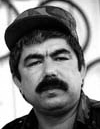
JONBISH MILI
Born: 1954, Khowja Dokoh/ Juzjan Province
He is one of the controversial figures in recent Afghan politics. Dostum was commander of the Juzjani " Dostum Militia" in late 1985 with 20,000 regular militia forces in northern provinces of Afghanistan. Then, he joined with Najib's government and fought against Mojahedin. He was awarded the " Hero of the Republic of Afghanistan" medal by President Dr. Najibullah. Abdur Rashid Dostum was a member of "Hezeb-e Watan/Homeland Party/ former PDPA. In 1992, he distanced from Dr. Najibullah and joined with Mujaheedin during the transition of power in Kabul in 1992. Gradually, he took distance from the central power in Kabul, the Mujahedeen government. Dostum established the "Jonbish Mili" organization. He has consolidated an independent North regions from the central power. His forces controled most of the northern provinces of Afghanistan. Once he united with the most extremist group of Mujahedeen like Golbedin.
In May 1997, Taliban temporarily took over of Mazar-e-Sharif and General Dostum fled to Turkey for a few month. Malik vice commander of Dostum ousted the Taliban troops from northern provinces of Afghanistan. Dostum returned from Turkey in October 1997. He is one of the key player in the Afghan war and political stability in Afghanistan. Under Dostum's power in Mazar-e-Sharif the schools and university of Mazar-i-Sharif have been opened and women freely could work and study outside the home contrary to other parts of the country under Taliban control![]()
Mahaz-e Mili-e Islami Afghanistan (National Islamic Front of Afghanistan)
Birth: 1932, Kabul/
Descendant of the Muslim Peer Baba Abdul Qadir Gailani (1077-1166) and hereditary head of the Qaderia Sufi fraternity. He succeeded to his position upon the death of his older brother, Sayed Ali, in 1964. Born in 1932 in Kabul, the son of Sayed Hasan Gailani, he was educated at Abu Hanifa College and the faculty of theology of Kabul University. He left Afghanistan after the Saur Revolution and founded the National Islamic Front (NIFA) in Peshawar. His movement is part of the seven-member alliance which in 1989 formed the "Afghan Interim Government." Although Sayed Gailani did not want any position in the interim government, he later accepted the post of supreme.
![]()
Organization: Hezeb-e Islami ( Islamic Party of Afghanistan)
Birth: 1919, Gandomak, Khugiani
Khalis fled to Pakistan because of his anti-reform activities against President Daoud in 1974. A member witt Gulbedin of Hezb-e Islami, he succeeded and formed his own group with the same name which fought the Kabul Government in som areas during the Afghan War against Kabul Regime. His military capabilities were not significant during the battle against the Kabul regime. He signed a number of times an alliance with other groups but never succeeded. At the present time he is unknown and lives outside the country.
![]()
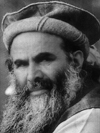
Itehad-e Islami barai Azadi Afghanistan ( Islamic Union for Liberation of Afghanistan), a Radical Islamist Movement, member of "Whabi" mujahedin group supported by Saudi Arabia
Birth: 1946, Paghman/Kabul Province
Sayaf was member of the Islamic movement and in 1971 deputy of Burhan-ul Din Rabani in Pakistan. He was imprisoned from 1974 to 1980 for his anti-social activities in Afghanistan. He was freed by Kabul regime after Saour Revolution in 1980. He is ideologically close to the groups of Hekmatyar and Mawlawi Khalis. He never has succeeded to become the power of Kabul regime. At the present time Sayaf lives outside the country and has no role in the Afghan political solution.
![]()
Harakat-e Inqilab-e Islami (Islamic Revoultionary Movement)
Born 1921, Logar Province
In the 1950, he was one of the first members of the religious establishment who agitated against leftist movement in the country. Elected to the parliament in 1964 as a representative of Logar. In 1978, after "Saour Revolution", he fled to Pakistan and utilized a network of mawlawis to organize armed resistance against Kabul regime. In early 1980, his group was one of the largest Mojahedin group; but his group has less influence in the current political situation in the country. After the take over of Taliban power of Kabul, Nabi Mohammadi has become less active in the political and military elite of Afghanistan.
![]()
Born: 1935, Kandahar Province
Mazari educated in Shi'ia university in Iraq. He is called as Ayatollah by his supporter (such as Iranian Shi'ia Ayatollah). In 1980, he was elected chairman of the " Afgahn Shi'ia Alliance", supported by Iran Government and headquartered in Iran during the Jahad; but later it moved to Quetta (Pakistan). In June 1990, the shi'ia groups announced formation of a new organization, called "Hezeb-e Whadat/Unity Party". One of his known allies was Ali Mazari who led the alliance after the Mujaheddin became in power. Ali Mazari was killed in a conspiracy by Pashtun Mujaheddin groups in 1994. The alliance involved in many bloody clashes with Mujaheddin Pashtun's groups, particularly with Hezeb-e Islami Gulbudin Hekmatyar.
Ali Mazari educated in Shi'ia university in Iraq. He is called as Ayatollah by his supporter (such as Iranian Shi'ia Ayatollah). In 1980, he was elected chairman of the " Afghan Shi'ia Alliance", supported by Iran Government and headquartered in Iran during the Jihad; but later it moved to Quetta (Pakistan). In June 1990, the Shi'ia groups announced formation of a new organization, called "Hezeb-e Whadat/Unity Party". One of his known allies was Ali Mazari who led the alliance after the Mujaheddin became in power. Ali Mazari was killed in a conspiracy by Taliban group in 1994. The alliance involved in many bloody clashes with Mujaheddin Pashtun's groups, particularly with Hezeb-e Islami Golbedin. At the present time the leader of Hezib Whadat is Karim Khalili who jointly fight with the North Alliance forces.
![]()


The Taliban movement was formed in Kandahar in 1994 by Islamic students who take a radical approach to interpreting Islam. The Taliban captured Kabul in September 1996 from Mujaheedin regime. The government of Burhan-ul Din Rabani ousted. The Taliban government in Kabul has been recognized only by Pakistan, Saudi Arabia and United Arab Republic. The Taliban regime strongly have been supported by Pakistani military regime.
Anti-Taliban factions still hold about 15 percent of the country in the northern parts of Afghanistan. The United Nations and other international communities condemn the Taliban regime because of its violation of human rights, particularly restrictions of women from outside work and freedom. On October 10, 1999, the United State government declare political and economical sanction against the Taliban regime in Afghanistan because of holding and supporting Saudi billionaire Ben Laden. October 25, 1999, Taliban offer talks between Afghanistan and the US Government including the future of Osma bin Laden. October 28, 1999. Saudi Millionaire declared his desire to leave Afghanistan November, 5, 1999: Bin Laden likely stay in Afghanistan A mysterious group of youth militia so called" Taliban" have been involved in the battle for capturing power in Afghanistan since late 1994 and early 1995. It is unknown who are the Taliban militia ? Where they came from? Are the Taliban fighters the Islamic theology students they claim to be, or they are the agent of Pakistan's secret service ISI? perhaps yes? It is not sure. Ex Afghan government led by Rabani insists they are the operatives of the ISI, Pakistan' secrete service agency, through which the United States and its allies funneled huge money and arms to Afghan Mujaheedin groups from 1979 to 1989 to fight Soviet presence in Afghanistan. The origin of the Taliban movement in southern Afghanistan in late 1994 was just as following : "A religious teacher; Mullah Mohammed Omar, organized his students, or " Taliban," into a band to pursue and kill a Mujaheedin leader and his men who had assaulted three women in the city of Kandahar". Anwar Munsuri, Deutsche Press Agents, in an article in wrote " The Taliban grew into a reformist force against the rape of Afghanistan by warlords and "corrupt and power-hungry" Mujaheedin groups. By February 1995, the Taliban successfully captured half of southern provinces without any resistance and surrounded Kabul suburbs; but they pushed back by government forces loyal to today's president Rabani. Pakistan had and has long term interest in Afghanistan. Pakistan deny the secrete tie with Taliban.The Taliban force is said to have from 25 to 30 thousand militia, more than 200 tanks and dozen aircraft, all captured from the Mujaheedin groups. Iran turned against Taliban after they captured 3 provinces bordering with Iran in western Afghanistan. In the past few months of the Rabani's regime the diplomatic relationships between Kabul and Islamabad worst and cool. In Kabul, the government of Rabani insisted that Pakistan interface in inside Afghan affairs and closely support Taliban militia. By 1996 Taliban Militia captured most of Afghan provinces except Northern. By September 1996, Rabani government with his defense minister Ahmad Shah Masoud left Kabul without any resistance and Taliban Militia captured the power of Kabul and established more strict Islamic rules in Afghanistan. 27 Province of Afghanistan became to the hand of Taliban except 3 Northern provinces led by powerful Uzbek leader General Abdur Rashid Dostum. The process of establishment of peace in Afghanistan became more complicated with uprising movement of Taliban. Taliban banned women from work outside the home, banned girls schools. The listening of music is against the ethical Islamic codes, as results of such understanding they banned the music in Kabul. Most of international human rights organizations condemned the Taliban strict regime. The Taliban regime was recognized only by Saudi Arabia, Pakistan and Emirate Arabia Republic. After the teror attack in New York on the 11th september 2001, the Emarate and Saudies broke diplomatic relation with Taleban.The US attacked Afghanistan on th 7th of october 2001![]()